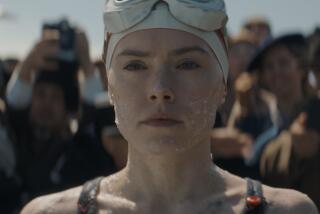BOOK REVIEW : A Celebration of the Human Spirit
- Share via
Five Against the Sea: A True Story of Courage & Survival by Ron Arias (New American Library: $18.95, 213 pages)
“I told God to control my dreams,” recalls Lidia, the young wife of a fisherman aboard the Cairo III. “If Gerardo was alive, show him to me alive. If he was dead, then let me see him dead. One way or the other, I had to know.”
Under Gerardo’s command, the 29-foot Cairo had sailed from the little fishing port of Puntarenas to work the waters off Costa Rica. The boat was overtaken by a violent tropical storm known as el norte , and nothing more was heard from the Cairo or its five-man crew. When the boat’s fishing net was discovered--the rumors said it contained a severed human hand--most sensible people assumed that the Cairo was lost at sea. But Lidia, as we are told by Ron Arias in “Five Against the Sea,” continued to see Gerardo in her dreams--and Gerardo was alive.
In fact, Gerardo and his shipmates survived, against all odds and expectations, for 142 days. They managed to fashion an improvised sail for the diesel-powered Cairo and crossed about 4,500 miles of open sea. When they were finally rescued by a Japanese fishing trawler, the Cairo was 500 miles east of Hawaii, and the men were dressed in the “death clothes” that they had put aside in anticipation of the day when food and water would finally run out.
The saga of the Cairo is one of the most remarkable in the literature of survival, and--as an appreciative reader of survival stories--I could not put it down. Still, I must confess that the prose is never more than serviceable, and the author’s insistent back-and-forth between the ordeals of the men at sea and their women at home is a little distracting. Most annoying of all is Arias’ inclusion of short bursts of first-person testimony by the people he is writing about, as if the author is simply giving up on trying to tell the story. Arias, we are told, is both a novelist and a reporter for People magazine, and the two styles are at war in “Five Against the Sea.”
Still, even if the book fails to meet the standard set by Piers Paul Read in the classic of the survival genre, “Alive,” the story of the Cairo contains the raw material of an epic. The crewmen wanted to run for the coast when el norte threatened, but the captain insisted on one more night of fishing. “To the beautiful sea,” Gerardo toasted, “thank you for your gifts!” When the storm left the engine and radio out of service, the crew quietly mutinied against its captain and set about the grim task of staying alive at sea.
The commonplace details of survival, I suppose, are one reason why such stories are so compelling. Here, we see how a Bic lighter, a few strands of wire and rope, a pocketknife, a hammer--the odds and ends of a poor fishing boat--can be used to sustain life under the most perilous circumstances. (“The lighter took on the importance of a spiritual, life-giving relic,” Arias explains.) By careful stewardship, unceasing hard work and sheer physical courage, the fishermen of the Cairo were able to overcome the threat of sharks, sperm whales, storms and starvation.
If there is a moral to the story in “Five Against the Sea,” it is the same one that we learn from “Alive” or my other personal favorite, “Survive the Savage Sea”: Survival is possible only when we have given up hope of rescue and turn to the task of saving ourselves. Early in their ordeal, still hoping for rescue by another ship, the men of the Cairo encountered a freighter in the international shipping lanes. But they were unable to make themselves understood to its Chinese crew--and the rescuers, in a scene of almost unbearable frustration and terror, left the crippled fishing boat behind at the orders of their callous master. Only then did the sailors resolve to make for a landfall on their own.
“It’s possible we’re going to die, right?” said Pastor. “Then let’s at least die fighting like men, not like cowards.” Survival stories almost always take on the shape and feel of allegory--the struggle of life against death on the open sea is so stark, and yet so momentous, that we are tempted to see these five humble sailors as symbols of humanity adrift in a threatening universe. Arias does not belabor the point, but we are entitled to see something noble and inspiring in his simple tale.
More to Read
Sign up for our Book Club newsletter
Get the latest news, events and more from the Los Angeles Times Book Club, and help us get L.A. reading and talking.
You may occasionally receive promotional content from the Los Angeles Times.









